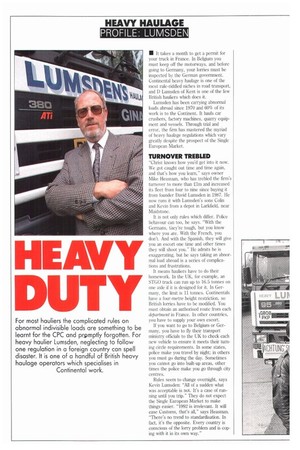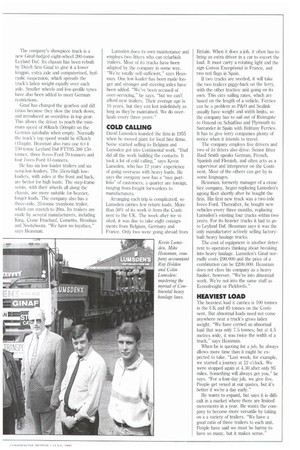HEAVY
Page 44

Page 45

If you've noticed an error in this article please click here to report it so we can fix it.
CO
For most hauliers the complicated rules on abnormal indivisible loads are something to be learnt for the CPC and priomptly forgotten. For heavy haulier Lumsden, neglecting to follow one regulation in a foreign country can spell disaster. It is one of a handful of British heavy haulage operators which specialises in Continental work.
• It takes a month to get a permit for your truck in France. In Belgium you must keep off the motorways, and before going to Germany, your lorries must be inspected by the German government. Continental heavy haulage is one of the most rule-riddled niches in road transport, and D Lumsden of Kent is one of the few British hauliers which does it.
Lumsden has been carrying abnormal loads abroad since 1970 and 60% of its work is to the Continent. It hauls car crushers, factory machines, quarry equipment and vessels. Through trial and error, the firm has mastered the myriad of heavy haulage regulations which vary greatly despite the prospect of the Single European Market.
TURNOVER TREBLED
"Christ knows how you'd get into it now. We got caught out time and time again, and that's how you learn," says owner Mike Heasrnan, who has trebled the firm's turnover to more than Lim and increased its fleet from four to nine since buying it from founder David Lumsden in 1987. He now runs it with Lumsclen's sons Colin and Kevin from a depot in Larkfield, near Maidstone.
It is not only rules which differ. Police behavour can too, he says. "With the Germans, they're tough, but you know where you are. With the French, you don't. And with the Spanish, they will give you an escort one time and other times they will shoot you." He admits he is exaggerating, but he says taking an abnormal load abroad is a series of complications and frustrations.
It means hauliers have to do their homework. In the UK, for example, an STGO truck can run up to 16.5 tonnes on one axle if it is designed for it. In Germany, the limit is 11 tonnes. Continentals have a four-metre height restriction, so British lorries have to be modified. You must obtain an authorised route from each department in France. In other countries, you have to supply your own escort.
If you want to go to Belgium or Germany, you have to fly their transport ministry officials to the UK to check each new vehicle to ensure it meets their turning circle requirements. In some states, police make you travel by night; in others you must go during the day. Sometimes you cannot go into built-up areas, other times the police make you go through city centres.
Rules seem to change overnight, says Kevin Lumsden: "All of a sudden what was acceptable is not. It's a case of running until you trip." They do not expect the Single European Market to make things easier. "1992 is irrelevant. It will ease Customs, that's all," says Heasman. "There's no trend to standardisation. In fact, it's the opposite. Every country is conscious of the lorry problem and is coping with it in its own way." The company's showpiece truck is a new Ginaf-badged eight-wheel 200-lonne Leyland Daf. Its chassis has been rebuilt by Dutch firm Ginaf to give it a lower kingpin, extra axle and computerised, hydraulic suspension, which spreads the truck's laden weight equally over each axle. Smaller wheels and low-profile lyres have also been added to meet German restrictions.
Ginaf has changed the gearbox and diff ratios because they slow the truck down, and introduced an overdrive in top gear. This allows the driver to reach the minimum speed of 80kmili (50mph) on the German autobahn when empty. Normally the truck's top speed would be 67km/h (41mph). Heasman also runs one 6x4 150-tonne Leyland Daf FIT95.380 150tunnel.. three lveco Ford 70-tonners and four lveco Ford 44-tonners.
lie has six low-loader trailers and six semi-low-loaders. The 55cm-high lowloaders, with axles at the front and back, are better for high loads, The step-frame semis, with their wheels all along the chassis, are more suitable for heavier, longer loads. The company also has a three-axle, 25-tonne trombone trailer, which can stretch to 20m. Its trailers are made by several manufacturers, including King. Crane Fruehauf, Cometto, Broshuis and Nooteboom. "We have no loyalties," says Heasman. Lumsden does its own maintenance and employs two fitters who can refurbish trailers, Most of its trucks have been adapted by the company in some way. "We're totally self-sufficient," says Heasman. One low-loader has been made longer and stronger and steering axles have been added. "We've been accused of over-servicing," he says, "but we can't afford new trailers. Their average age is 10 years, but they can last indefinitely as long as they're maintained. We do overhauls every three years."
COLD CALLING
David Lumsden founded the firm in 1955 when he moved plant for local hire firms. Some started selling to Belgium and Lumsden got into Continental work. "Dad did all the work building the contacts. It took a lot of cold calling," says Kevin Lumsden, who has 12 years' experience of going overseas with heavy loads. He says the company now has a ''nice portfolio' of customers, a quarter are foreign, ranging from freight forwarders to manufacturers.
Arranging each trip is complicated, so Lumsden carries few return loads. More than 50 of its work is from the Continent to the UK. The week after we visited. it was due to take eight consignments from Belgium, Germany and France. Only two were going abroad from
Britain. When it does a job, it often has to bring an extra driver in a car to escort the load. It must carry a rotating light and the sign Convoi Exceptional in France, and two red flags in Spain.
If two trucks are needed, it will take the two trailers piggy-back on the ferry, with the other tractive unit going on its own. This cuts sailing rates, which are based on the length of a vehicle. Ferries can be a problem as P&O and Sealink usually have weight and width limits, so the company has to sail out of Ramsgate to Ostend on Schiaffino and Plymouth to Santander in Spain with Brittany Ferries. It has to give ferry companies plenty of notice when it intends to travel.
The company employs five drivers and two of its fitters also drive. Senior fitter Basil Smith speaks German, French, Spanish and Flemish, and often acts as a supervisor and interpreter on the Continent. Most of the others can get by in some languages.
Heasman, formerly manager of a crane hire company, began replacing Lumsden's ageing fleet shortly after he bought the firm, his first new truck was a two-axle lveco Ford. Thereafter, he bought new vehicles every three months, replacing Lumsden's existing four trucks within two years. For its heavier trucks it had to go to Leyland Daf. Heasman says it was the only manufacturer actively selling factorybuilt heavy haulage trucks.
The cost of equipment is another deterrent to operators thinking about breaking into heavy haulage. Lumsden's Ginaf normally costs 290,000 and the price of a combination can be 2200,000. Ileasman does not class his company as a heavy haulier, however. "We're into abnormal work. We're not into the same stuff as Econofreight or Pickfords."
HEAVIEST LOAD
The heaviest load it carries is 100 tonnes in the UK and 85 tonnes on the Continent. But abnormal loads need not come anywhere near a truck's gross laden weight. "We have carried an abnormal load that was only 7.5 tonnes, but at 4.5 metres wide, it was twice the width of a truck," says Heasman.
When he is quoting for a job, he always allows more time than it might be expected to take. "Last week, for example, we started a journey at 12 o'clock, We were stopped again at 4.30 after only 95 miles. Something will always get you," he says. "For a four-day job, we give five. People get vexed at our quotes, but it's .better if we're a day early."
He wants to expand, but says it is difficult in a market where there are limited movements in a year. He wants the company to become more versatile by taking on a a variety of trailers. "We have a good ratio of three trailers to each unit. People have said we must be barmy to have so many, but it makes sense."




















































































































